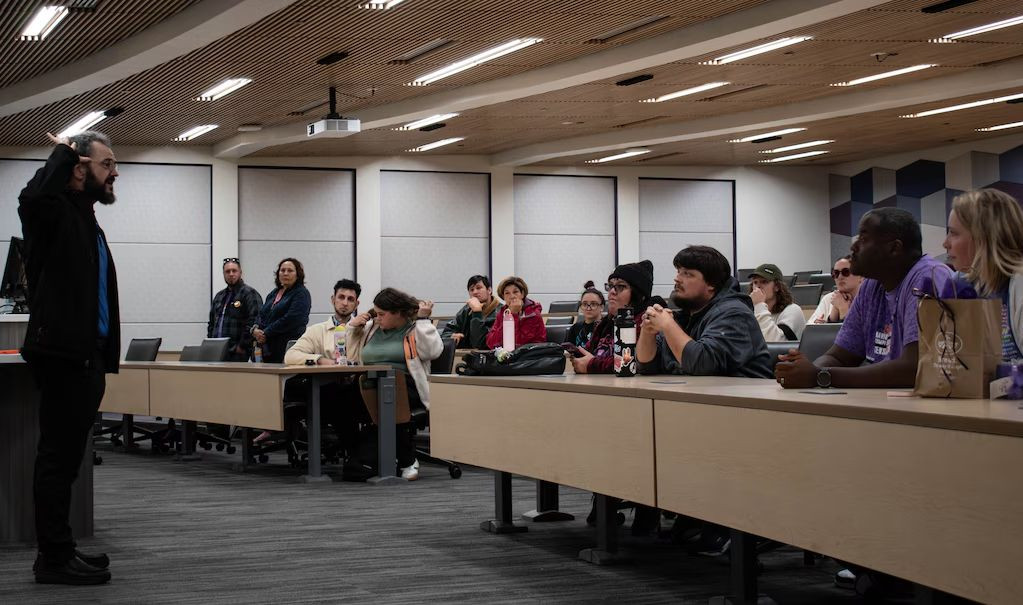A steady rain drove a “teach in” on censorship at Weber State University indoors on Friday, but the speakers and attendees were as persistent as the turbulent weather.
“The rain hit us hard, but people were still willing to stay for it,” said Barrett Bonella, a professor of social work at Weber State. “People really wanted to hear and be a part of this.”
Bonella is chief steward of The Wildcat Collective, a branch of the American Federation of Teachers’ Utah College Council — the union that represents university faculty and staff. The union organized the “teach in” as an alternate conference to Weber State’s annual Unity Conference.
Organizers canceled the Unity Conference this week, after being told by university officials that speakers would have to censor some of their talks. The topic of the conference was censorship.
Among those attending Friday’s campus event was Ogden School Board member Stacy Bernal, a Weber State alumna who was, according to her biography, the first manager of diversity, equity and inclusion for the Utah Jazz.
“It’s wild to me to be living out this censorship in real-time,” Bernal said. “To be just someone watching it as it was coming up in the news and on social media, I just truly couldn’t believe it.”
The alternative “teach in” was scheduled to be held Friday on the front steps of Stewart Library. When the rain started to pour around 11 a.m., and kept going through the two-hour event, The Wildcat Collective worked with campus police to move the event into a temporary indoor space.
Once inside Lindquist Hall, though, attendees were told discussions would have to adhere to the limits placed by the Utah Legislature under HB261. At that point, the event shifted to small-group discussions.
The “teach in,” which organizers called “Unity Conference: Uncensored Version,” included open-mic opportunities and speeches, featuring presenters from the canceled conference. About 50 people attended the event, as speakers discussed book banning, the limitations of censorship on scientific research and other topics.
HB261, passed by lawmakers and signed by Gov. Spencer Cox, restricts how certain topics — such as anti-racism, bias, critical race theory, oppression, intersectionality, discriminatory practices, systemic bias or personal identity characteristics — can be addressed in some higher education settings.
In an email sent to faculty and staff Friday, the president’s office at Weber State addressed the cancellation of the Unity Conference. The office cited poor communication and unclear definitions of HB261.
In the email, the administration wrote that “we recognize that this has been difficult to navigate and that there have been times when communication could have been clearer.
“We apologize for the frustration this has caused. We are truly working to move forward, through what has sometimes been shifting guidance, together.”
The administration stressed that faculty are exempt from HB261 when they teach, conduct research, join scholarly events and discuss complex or controversial issues in their field. However, other campus events — like those under the umbrella of the university’s Student Access & Success department, such as the Unity Conference — are not exempt, and must follow the content limits of HB261.
“Because of this difference, some proposed Unity Conference sessions were better suited for academic venues, while others raised compliance concerns because this was a conference hosted by Student Access & Success,” the administration wrote.
Richard Price, a political science professor at Weber State, was one of the original panelists scheduled to discuss censorship at the canceled Unity Conference. When university officials said speakers would have to restrict their language, Price wrote to the university’s president, Brad Mortensen, saying they “could no longer ethically participate.”
Price told The Signpost on Friday that while, in theory, HB261 shouldn’t affect their teaching, in reality there is no way the law won’t change how professors in Utah educate students.
“I could teach what I want in theory within the confines of my academic discipline, which is what I do,” Price said. “But I can’t talk to a general audience on campus about it, because they start to worry that it looks like the university is endorsing what I’m saying.”
Last fall, Price said they gave a talk on LGBTQ history, and administrators pushed back — even though, they said, the administrators only had access to the title of Price’s talk: “LGBTQ Education and Higher Ed.”
“The perspective that administrators are taking essentially is that anything that references groups of people — whether it’s queer people, Black History Month, whatever — can’t be done because it might piss off a legislator,” Price said.
The administration in its email closed by saying it plans to discuss the situation further with Weber State’s faculty senate and staff advisory council meetings.
Alfonso Rubio, Jared Mitchell, James Gordon and Kyle Greenawalt reported this story as student journalists at Weber State University’s The Signpost. It is published as part of an ongoing collaborative including nonprofits Amplify Utah and The Salt Lake Tribune.



